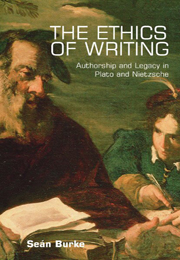Book contents
- Frontmatter
- Contents
- Acknowledgements
- Key to References and Abbreviations
- Prologue: Friedrich Nietzsche in Auschwitz, or the Posthumous Return of the Author
- Introduction: The Responsibilities of the Writer
- Chapter 1 The Ethical Opening
- Chapter 2 The Ethics of Legacy
- Chapter 3 Signature and Authorship in the Phaedrus
- Chapter 4 The Textual Estate: Nietzsche and Authorial Responsibility
- Conclusion: Creativity versus Containment: The Aesthetic Defence
- Bibliography
- Index
Chapter 3 - Signature and Authorship in the Phaedrus
Published online by Cambridge University Press: 12 September 2012
- Frontmatter
- Contents
- Acknowledgements
- Key to References and Abbreviations
- Prologue: Friedrich Nietzsche in Auschwitz, or the Posthumous Return of the Author
- Introduction: The Responsibilities of the Writer
- Chapter 1 The Ethical Opening
- Chapter 2 The Ethics of Legacy
- Chapter 3 Signature and Authorship in the Phaedrus
- Chapter 4 The Textual Estate: Nietzsche and Authorial Responsibility
- Conclusion: Creativity versus Containment: The Aesthetic Defence
- Bibliography
- Index
Summary
Living, as we do, deep within a print culture (perhaps even in its twilight) we are at an incalculable remove from the sinister prospects oered by writing in Plato's lifetime. The proprietorial ethic by which he seeks to limit discursive circulation is alien to our temper. Yet with a certain leap of empathy we might see that his concern with discourses being unable to discriminate between suitable and unsuitable readers need not be so remote from our own concerns.
The reception histories of the Hegelian, Marxist, Nietzschean and Freudian discourses, for example, commend themselves to our attention precisely within the ethical problematic demarcated here by Plato. Despite his eorts in setting up the First International, Marx had no means of foreseeing who his readers would be or how they would find themselves stationed. The discursive legacy itself was powerless to stop Marxism becoming the conceptual legitimation of Soviet Communism and – by grotesque extension – the Stalinist regime. Nietzsche, too – who wrote in the knowledge that people would make mischief with his essays, aphorisms, his ‘maxims and arrows’ – had no way of correcting the National Socialist appropriations of his work. ‘The best sense of play is play that is supervised and contained within the safeguards of ethics and politics’ (PP, 156), Derrida says of the seeming carceral walls Plato would erect around the discursive space. The dynamic of play and seriousness, of game and gravity, which the Phaedrus weaves around the question of writing is motivated by a desire to guard against the game becoming dangerous, the discursive mask masquerading as the man, the ludic being taken for the grave, the playful careening into the heinous, the fatal.
- Type
- Chapter
- Information
- The Ethics of WritingAuthorship and Legacy in Plato and Nietzsche, pp. 144 - 191Publisher: Edinburgh University PressPrint publication year: 2008



